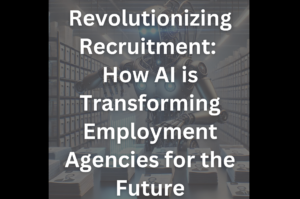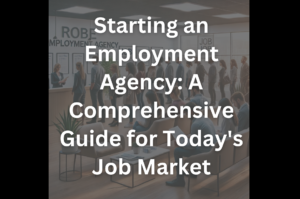**Disclosure:** We believe in honesty and transparency to the fullest extent. Some of the links on this blog are affiliate links, meaning, at no additional cost to you, we will earn a commission if you click through and make a purchase. This is one of the simplest ways you can support us.
In today’s fast-paced world, the demand for efficient and reliable support has never been higher, especially among busy professionals. As technology advances, AI assistants have emerged as a powerful solution to help manage tasks, streamline workflows, and enhance productivity. These digital assistants are not just a luxury; they are becoming an essential tool for executives, small business owners, and entrepreneurs who need to maximize their time and efficiency.
Allow us to walk you through the process of starting their own agency specializing in creating AI assistants for busy professionals. By understanding the market, setting up the right infrastructure, and leveraging the latest in AI technology, you can tap into this growing industry and provide valuable services to those who need it most.
Understanding AI Assistants
AI assistants are software agents that can perform tasks or services for individuals based on commands or questions. They come in various forms, such as virtual personal assistants, chatbots, and voice-activated assistants, each designed to meet specific needs and use cases.
Key features and functionalities of AI assistants include:
- Natural Language Processing (NLP): Allows the assistant to understand and respond to human language in a natural way.
- Machine Learning (ML): Enables the assistant to learn from interactions and improve over time.
- Task Automation: Handles repetitive tasks such as scheduling, reminders, and data entry.
- Integration with Other Tools: Connects with calendars, emails, and other software to provide seamless support.
Popular examples of AI assistants include Apple’s Siri, Amazon’s Alexa, and Google Assistant. These platforms have set high standards for functionality and user experience, making it crucial for new entrants to innovate and offer unique features tailored to their target audience.
Understanding the core technologies behind AI assistants is essential for developing effective solutions. Natural Language Processing (NLP), Machine Learning (ML), and speech recognition are the pillars that support the capabilities of these assistants. Customizing and personalizing these technologies to fit the specific needs of different professional sectors will be key to your agency’s success.
One tool that you will find incredibly useful in creating your AI agency is Eleven Labs uses artificial intelligence (AI) and machine learning (ML) to create voice technology tools for content creators, web platforms, and production studios. Click Here to learn more!
Market Research
Before diving into the development and launch of your AI assistant agency, conducting thorough market research is crucial. Understanding the landscape will help you identify opportunities, refine your offerings, and position your agency for success.
Analyzing Demand
AI assistants are in demand across various industries. For instance:
- Healthcare: Doctors and medical professionals use AI assistants for scheduling, patient follow-ups, and managing electronic health records.
- Finance: Financial advisors and bankers rely on AI for data analysis, customer service, and fraud detection.
- Legal: Lawyers use AI to manage case files, conduct legal research, and automate routine tasks.
- Real Estate: Real estate agents benefit from AI in lead generation, customer interactions, and property management.
Identifying your target audience is the next step. Focus on busy professionals who can benefit the most from AI assistants, such as CEOs, small business owners, and executives. These individuals often have hectic schedules and can significantly enhance their productivity with the help of AI technology.
Competitor Analysis
Study existing agencies and their offerings. Analyze their strengths and weaknesses, and identify gaps in the market that your agency can fill. Look at their pricing models, service packages, and customer feedback to understand what works and what doesn’t.

Market Trends and Future Projections
Stay informed about the latest trends in AI and related technologies. Understanding advancements in NLP, ML, and data security can help you stay ahead of the curve. Future projections indicate a growing reliance on AI assistants, making it a lucrative market for new entrants.
Setting Up the Agency
Once you have a clear understanding of the market, it’s time to set up your agency. This involves defining your business model, addressing legal considerations, gathering resources, and building a competent team.
Business Model Options
Consider various business models, such as:
- Subscription-Based: Clients pay a recurring fee for continuous access to AI assistant services.
- Project-Based: Clients pay per project or task, which may suit businesses with specific, one-time needs.
- Hybrid Model: Combines elements of both subscription and project-based models, offering flexibility to clients.
Legal Considerations
Ensure your business complies with all relevant laws and regulations. This includes:
- Business Structure: Decide whether to establish your agency as a sole proprietorship, partnership, LLC, or corporation.
- Licenses and Permits: Obtain any necessary licenses and permits required to operate your business legally.
- Contracts: Draft clear contracts for clients that outline the scope of services, payment terms, and confidentiality agreements.
- Intellectual Property: Protect your AI algorithms and software with patents or copyrights.
Required Resources
Assemble the necessary technology stack, software, and tools. Invest in robust AI development platforms, secure servers, and reliable communication tools. Ensure you have the infrastructure to support your operations and client needs. Also, note that there are existing tools that you can integrate to assist in managing your client’s needs. You won’t have to build an entire system if you don’t want but you will need to source the right exiting tech.
Hiring the Right Team
Building a skilled team is critical to your agency’s success. Key roles include:
- AI Developers: Experts in NLP, ML, and AI technologies who can build and refine your AI assistants.
- Data Scientists: Professionals who can analyze data to improve AI performance and tailor solutions to client needs.
- Sales and Marketing Professionals: Individuals who can effectively market your services and generate leads.
- Customer Support Staff: Team members who can provide excellent customer service and handle client inquiries.
By setting up a solid foundation for your agency, you position yourself for success in the competitive AI assistant market.
Developing AI Assistants
Creating effective AI assistants requires a deep understanding of core technologies and a commitment to customization and personalization. Here’s how to approach the development process:
Core Technologies
- Natural Language Processing (NLP): NLP allows AI assistants to understand and respond to human language naturally. Investing in advanced NLP algorithms ensures your AI can handle diverse commands and conversations accurately.
- Machine Learning (ML): ML enables AI assistants to learn from interactions and improve over time. Incorporate ML models that can analyze user behavior, predict needs, and enhance the assistant’s efficiency.
- Speech Recognition: For voice-activated assistants, reliable speech recognition technology is essential. Ensure your AI can accurately interpret voice commands in various accents and environments.
Building a Robust AI Framework
Develop a scalable AI framework that can support multiple clients and adapt to their unique needs. This includes:
- Backend Infrastructure: Use cloud services to ensure your AI assistants have the computational power and storage they need.
- APIs and Integrations: Create APIs that allow your AI assistants to integrate seamlessly with clients’ existing tools and systems, such as calendars, emails, and CRMs.
- User Interface (UI): Design an intuitive UI that makes it easy for clients to interact with and customize their AI assistants.

Customization and Personalization
Tailor your AI assistants to meet the specific needs of different professional sectors. For instance:
- Healthcare Professionals: Develop assistants that can manage patient appointments, send follow-up reminders, and access electronic health records.
- Financial Advisors: Create AI that can analyze financial data, generate reports, and provide customer service.
- Real Estate Agents: Build assistants that can handle lead generation, schedule property viewings, and manage client communications.
Ensuring Data Security and Privacy
Data security is paramount when dealing with sensitive information. Implement robust security measures such as encryption, secure authentication, and compliance with data protection regulations (e.g., GDPR, CCPA). Regularly update your security protocols to protect against emerging threats.
Marketing and Sales Strategy
To successfully launch your AI assistant agency, a comprehensive marketing and sales strategy is essential. This will help you attract clients, build your brand, and establish a strong market presence.
Branding the Agency
Create a compelling brand identity that resonates with your target audience. This includes:
- Name and Logo: Choose a memorable name and design a professional logo that reflects your agency’s values and mission.
- Unique Selling Proposition (USP): Define what sets your agency apart from competitors. Highlight unique features, superior customer service, or industry-specific expertise.
Creating a Strong Online Presence
Build an engaging online presence to reach potential clients and showcase your expertise:
- Website: Develop a professional website that provides detailed information about your services, case studies, client testimonials, and contact details. Ensure the site is SEO-optimized to attract organic traffic.
- Social Media: Leverage platforms like LinkedIn, Twitter, and Facebook to share industry insights, company updates, and engage with your audience. Use targeted ads to reach your ideal clients.
- Content Marketing: Publish blog posts, whitepapers, and videos that demonstrate your knowledge of AI technology and its applications. This content can help establish your agency as a thought leader in the industry.

Lead Generation Strategies
Identify effective ways to generate leads and attract potential clients:
- Networking: Attend industry conferences, webinars, and networking events to connect with professionals who may benefit from your services.
- Partnerships: Form strategic partnerships with other businesses, such as tech companies or consulting firms, to reach a broader audience.
- Targeted Advertising: Use online advertising platforms like Google Ads and LinkedIn Ads to target specific demographics and industries.
Sales Tactics
Convert leads into clients with effective sales tactics:
- Demonstrations: Offer live demos of your AI assistants to showcase their capabilities and answer potential clients’ questions.
- Free Trials: Provide free trials or pilot programs to allow clients to experience the benefits of your AI assistants firsthand.
- Case Studies: Share detailed case studies that highlight successful implementations and the tangible benefits clients have achieved using your AI assistants.
By implementing a well-rounded marketing and sales strategy, you can effectively promote your agency, attract clients, and drive growth in the competitive AI assistant market.
Customer Support and Maintenance
Providing exceptional customer support and maintaining your AI assistants are crucial for ensuring client satisfaction and fostering long-term relationships. Here’s how to manage these aspects effectively:
Importance of Providing Excellent Customer Service
Customer service is a key differentiator in the competitive AI assistant market. By offering responsive and helpful support, you can build trust and loyalty among your clients. Excellent customer service involves:
- Quick Response Times: Ensure your support team responds to inquiries promptly.
- Professional and Friendly Interaction: Train your team to handle client interactions with professionalism and empathy.
- Problem-Solving Approach: Focus on resolving issues efficiently and providing clear solutions.
Setting Up Support Channels
Establish multiple support channels to accommodate client preferences and ensure accessibility:
- Email: Offer a dedicated support email address for clients to submit inquiries.
- Phone: Provide a customer service hotline for immediate assistance.
- Chat: Implement live chat support on your website for real-time help.
- Helpdesk Software: Use helpdesk software to manage and track support requests, ensuring timely and effective resolution.
Regular Updates and Improvements
Continuously improving your AI assistants is essential for maintaining their effectiveness and meeting evolving client needs:
- Software Updates: Regularly update your AI software to incorporate new features, fix bugs, and enhance performance.
- Performance Monitoring: Monitor the performance of your AI assistants and gather data on their interactions to identify areas for improvement.
- Client Feedback: Actively seek feedback from clients to understand their experiences and preferences. Use this feedback to guide your development efforts.
Gathering and Utilizing Customer Feedback
Customer feedback is invaluable for refining your AI assistants and services:
- Surveys and Questionnaires: Periodically send surveys and questionnaires to clients to gather detailed feedback on their experiences.
- User Testing: Conduct user testing sessions with clients to observe how they interact with your AI assistants and identify any usability issues.
- Feedback Loop: Establish a feedback loop where client input is regularly reviewed and incorporated into your development process.
Challenges and Solutions
Starting an AI assistant agency comes with its own set of challenges. By anticipating these challenges and developing practical solutions, you can navigate the complexities of the industry more effectively.
Common Challenges in the AI Assistant Industry
- Technological Limitations: AI technology is continuously evolving, but it may still have limitations in understanding complex queries or handling nuanced tasks.
- Customer Adoption: Some clients may be hesitant to adopt AI assistants due to concerns about reliability, privacy, or resistance to change.
- Data Security: Protecting sensitive client information is paramount, and any security breaches can severely damage your reputation.
- Customization Complexity: Different clients have unique needs, and customizing AI assistants to meet these specific requirements can be time-consuming and complex.
Practical Solutions and Strategies
- Stay Updated with Technology: Keep abreast of the latest advancements in AI and integrate cutting-edge technologies into your offerings. Partner with tech experts and continuously invest in R&D.
- Educate Clients: Provide educational resources, such as webinars, whitepapers, and tutorials, to help clients understand the benefits and functionalities of AI assistants. Offer hands-on training sessions to ease the transition.
- Robust Security Measures: Implement strong data encryption, secure authentication protocols, and regular security audits to safeguard client data. Ensure compliance with relevant data protection regulations (e.g., GDPR, CCPA).
- Efficient Customization: Develop modular AI solutions that allow for easier customization. Use scalable AI frameworks and templates to streamline the customization process. Leverage client feedback to prioritize and refine features.
Conclusion
Starting an agency that creates AI assistants for busy professionals is not just a promising business opportunity—it’s a brilliant way to demonstrate the transformative power of AI in real-world applications. By diving into this growing market, you can build a successful enterprise that helps professionals streamline their tasks, boost productivity, and focus on what truly matters.
One of the most compelling aspects of running an AI assistant agency is the ability to use your own services to enhance your business operations. By employing AI assistants within your agency, you can:
- Automate Routine Tasks: Save time by automating scheduling, email management, and data entry.
- Enhance Customer Interaction: Use AI-powered chatbots to provide 24/7 customer support and handle inquiries efficiently.
- Streamline Workflows: Integrate AI assistants with your CRM and other tools to maintain seamless operations and improve productivity.
By using your AI assistants to run your own business, you not only increase efficiency but also create a powerful case study that showcases the effectiveness of your services. Clients can see firsthand how well AI assistants work and the tangible benefits they bring, making your agency a living testament to the value of AI technology.










